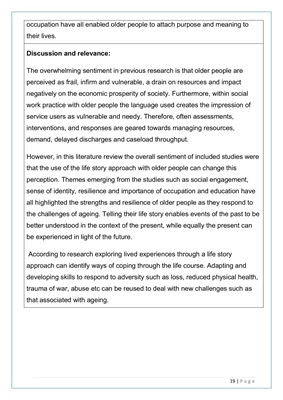
19 | P a g e
occupation have all enabled older people to attach purpose and meaning to
their lives.
Discussion and relevance:
The overwhelming sentiment in previous research is that older people are
perceived as frail, infirm and vulnerable, a drain on resources and impact
negatively on the economic prosperity of society. Furthermore, within social
work practice with older people the language used creates the impression of
service users as vulnerable and needy. Therefore, often assessments,
interventions, and responses are geared towards managing resources,
demand, delayed discharges and caseload throughput.
However, in this literature review the overall sentiment of included studies were
that the use of the life story approach with older people can change this
perception. Themes emerging from the studies such as social engagement,
sense of identity, resilience and importance of occupation and education have
all highlighted the strengths and resilience of older people as they respond to
the challenges of ageing. Telling their life story enables events of the past to be
better understood in the context of the present, while equally the present can
be experienced in light of the future.
According to research exploring lived experiences through a life story
approach can identify ways of coping through the life course. Adapting and
developing skills to respond to adversity such as loss, reduced physical health,
trauma of war, abuse etc can be reused to deal with new challenges such as
that associated with ageing.